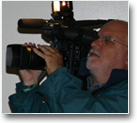 Trent University’s Disability Services Office Awarded $30,000 to Coordinate New Phase of Speech Recognition Technology ResearchFOR IMMEDIATE RELEASE New Device Triples Ability of Hearing Challenged People to Access Information Monday, July 21, 2008, Peterborough
“Most people who can’t hear survive by lip reading, which only provides 20 per cent of the information spoken,” explained Eunice Lund-Lucas, director of the DSO, who has led Trent’s involvement with this project over the past three years. “With this new speech recognition device, these individuals can now access 60 to 80 per cent of the information conveyed when someone is speaking. Our goal is 100 per cent.” The device combines OQO, one of the world’s smallest handheld computer models with Viascribe, a voice recognition software program developed by IBM. As a speaker converses into a microphone they are wearing, the device transcribes the words spoken onto the digital screen in real time, allowing others to access the information immediately by reading them. Trent has been involved in this research project, called Universal Liberated Learning, for three years, along with its partners St. Mary’s University in Halifax and IBM. In Phase I, these partners received funding to engage disability organizations from across Canada in discussions to explore how speech recognition technology can assist their members in everyday situations. During Phase II, case study pilots were conducted using speech recognition in three distinct areas of daily life – the high school classroom, the workplace, and the online learning environment. Trent’s role during the first two phases was to carry out the evaluation of the project’s various activities. “For Phase III, Trent will once again take on this evaluation role as well as a more direct role in the coordination of the research aspect of the project,” said Ms. Lund-Lucas. “This third phase will entail expanding the earlier case studies to include more geographic areas within Canada as well as to investigate new innovations in the use of technologies within these settings.” Ms. Lund-Lucas noted that this new technology will open up a new world of opportunity for Trent students, both in the classroom and as they transition to work. “We’ve been able to improve this technology by listening to the feedback we’ve received both from users and Trent professors who have used it to give lectures.” Some of the modifications include making the units smaller and more portable, as well as incorporating a wireless microphone. The latest configuration developed by Trent debuted at the International Federation of Hard of Hearing Congress held from July 2 to 4 in Vancouver. Ainsley Latour, a youth member of the Canadian Hard of Hearing Association (CHHA) and Trent University alumna, used the device to discuss her presentation with CHHA executive director, Janice McNamara. -30- For further information, or to request a demonstration of this speech recognition technology, please contact: Eunice Lund-Lucas or Brittany Cadence |

































 The Disability Services Office (DSO) of Trent University has been awarded $30,000 from the federal government’s Office of Disability Issues to coordinate a new phase in a multi-year research project designed to perfect speech recognition technologies to assist Canadians who have hearing challenges.
The Disability Services Office (DSO) of Trent University has been awarded $30,000 from the federal government’s Office of Disability Issues to coordinate a new phase in a multi-year research project designed to perfect speech recognition technologies to assist Canadians who have hearing challenges.